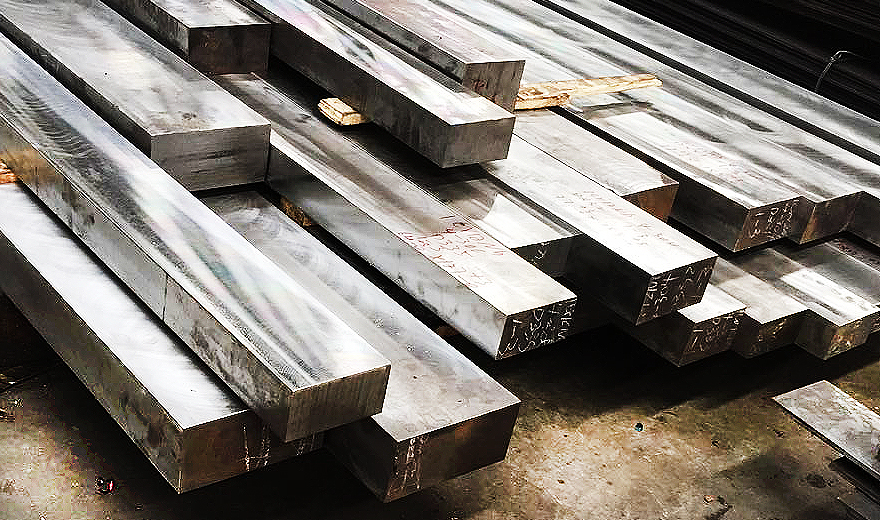L&H

403Cb Stainless Steel Forged QT Bar
- Smelting Method:
- Delivery status: Forged 、Q+T 、
- Dimensions: Dia.190mm x 350 x 3000mm
- Surface: Milling 、
- Standard: ASTM
Quick Details
403Cb Stainless Steel Forged QT Bar, AOD+ESR, Hot-Froged, Q&T, Milled
Stock Status
Product Details
403Cb Steel bars and forgings for blade manufacture
This specification covers one (1) grade of specialty martensitic stainless steel, commonly referred to the designation 403Cb. This material is used primarily for turbine and compressor components in applications requiring high strength and corrosion resistance to 900℉.The bar materials supplied to this specification shall conform to ASTM A1028-03 Grade E class 2, and forgings shall confirm to ASTM A982-2 Grade E class 2. with supplementary requirements S1 and S7. and with exceptions as noted in this standard.
Process: AOD+ESR or other.
Chemical Composition
| Carbon(C) | 0.13 | 0.18 |
| Manganese(Mn) | 0.40 | 0.60 |
| Phosphorus(P) | 0.03 | max |
| Sulfur(S) | 0.03 | max |
| Silicon(Si) | 0.50 | max |
| Nickel(Ni) | 0.75 | max |
| Chromium(Cr) | 11.5 | -13 |
| Molybdenum(Mo) | 0.20 | max |
| Aluminum(Al) | 0.05 | max |
| Vanadium(V) | 0.10 | max |
| Niobium(Columbium) (Nb) | 0.15 | 0.25 |
Heal Treatment
- 4.1 Austenitizing Material shall be heated to 1725-1775 °F and held for a period of time long enough to ensure a uniform temperature of the core of each part in the load, but not less than two hours.
- Quenching Oil quench to below 600 °F followed by air cooling to room temperature for complete transformation.
- Tempering Material shall be tempered at a temperature not lower than 1150°F holding at temperature not less than (1) hour per inch of part thickness. Uniformly cool below the martensite finish temperature. Actual temper temperature will be adjusted to meet the mechanical properties shown in section (5).
- Stress Relief Anneal A stress relief anneal is required after all final straightening, This includes any localized gag or press straightening. Material shall be stress relieved at 50 °F below the final tempering temperature.
Mechanical Properties
- Tensile strength: min, 115,000 psi.
- Yield strength: min. 100,000 psi (@ 0.2% offset)
- Elongation in 2 in.: min. 20%
- Reduction of area: min. 55%
- Charpy impact energy avg. of three (3) specimens: 40(ft. tbs.) Charpy impact energy min. for any one (1) sample: 35 (ft. lbs.)
- Brinell hardness of bars and forgings: 248 - 270 (BHN)
403Cb Steel bars and forgings for blade manufacture
This specification covers one (1) grade of specialty martensitic stainless steel, commonly referred to the designation 403Cb. This material is used primarily for turbine and compressor components in applications requiring high strength and corrosion resistance to 900℉.The bar materials supplied to this specification shall conform to ASTM A1028-03 Grade E class 2, and forgings shall confirm to ASTM A982-2 Grade E class 2. with supplementary requirements S1 and S7. and with exceptions as noted in this standard.
Process: AOD+ESR or other.
Chemical Composition
| Carbon(C) | 0.13 | 0.18 |
| Manganese(Mn) | 0.40 | 0.60 |
| Phosphorus(P) | 0.03 | max |
| Sulfur(S) | 0.03 | max |
| Silicon(Si) | 0.50 | max |
| Nickel(Ni) | 0.75 | max |
| Chromium(Cr) | 11.5 | -13 |
| Molybdenum(Mo) | 0.20 | max |
| Aluminum(Al) | 0.05 | max |
| Vanadium(V) | 0.10 | max |
| Niobium(Columbium) (Nb) | 0.15 | 0.25 |
Heal Treatment
- 4.1 Austenitizing Material shall be heated to 1725-1775 °F and held for a period of time long enough to ensure a uniform temperature of the core of each part in the load, but not less than two hours.
- Quenching Oil quench to below 600 °F followed by air cooling to room temperature for complete transformation.
- Tempering Material shall be tempered at a temperature not lower than 1150°F holding at temperature not less than (1) hour per inch of part thickness. Uniformly cool below the martensite finish temperature. Actual temper temperature will be adjusted to meet the mechanical properties shown in section (5).
- Stress Relief Anneal A stress relief anneal is required after all final straightening, This includes any localized gag or press straightening. Material shall be stress relieved at 50 °F below the final tempering temperature.
Mechanical Properties
- Tensile strength: min, 115,000 psi.
- Yield strength: min. 100,000 psi (@ 0.2% offset)
- Elongation in 2 in.: min. 20%
- Reduction of area: min. 55%
- Charpy impact energy avg. of three (3) specimens: 40(ft. tbs.) Charpy impact energy min. for any one (1) sample: 35 (ft. lbs.)
- Brinell hardness of bars and forgings: 248 - 270 (BHN)